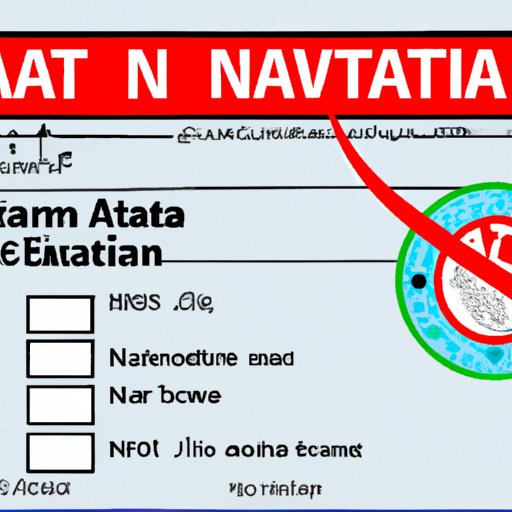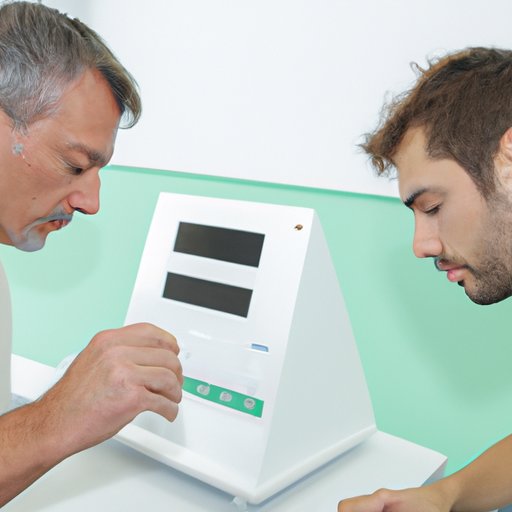Introduction
Traveling during the COVID-19 pandemic requires extra caution and preparation. Many countries are now requiring travelers to present negative test results before entering their borders. One type of test that is increasingly being used for travel is the Nucleic Acid Amplification Test (NAAT). This article will explore if a NAAT test is an acceptable option for travel and the pros and cons associated with it.
Background on Naat Tests
A NAAT test is a type of molecular diagnostic test that is used to detect the presence of genetic material from viruses or bacteria. It works by amplifying small amounts of genetic material so that it can be more easily detected. NAAT tests are often used to detect diseases such as HIV, influenza, and tuberculosis. More recently, they have been used to detect the presence of the SARS-CoV-2 virus, which causes COVID-19.
Examining the Acceptability of a Naat Test for Travel
Different countries have different regulations regarding the acceptability of a NAAT test for travel. Some countries may require travelers to present a negative result from a NAAT test taken within a certain timeframe before arriving in the country. Other countries may allow travelers to take a NAAT test upon arrival at the airport.

Factors to Consider Before Taking a Naat Test
Before taking a NAAT test for travel, there are several factors to consider. First, the cost of the test should be taken into account. Depending on the country, the cost of a NAAT test may vary. Additionally, travelers should also consider the timeframe for obtaining the results. Most NAAT tests take between 24 and 48 hours to process, but some countries may require the results to be obtained within a shorter timeframe.

Potential Restrictions on Travel with a Naat Test Result
Even if a traveler has a negative result from a NAAT test, they may still face restrictions when traveling. For example, some countries may require travelers to quarantine or self-isolate upon arrival, regardless of their test result. Additionally, some countries may not accept NAAT tests from certain laboratories or require additional testing or documentation. Therefore, it is important for travelers to research any potential restrictions before traveling with a NAAT test result.
Understanding the Reliability of Naat Tests for Travel
The accuracy of NAAT tests varies depending on the type of test being used. Reverse transcription polymerase chain reaction (RT-PCR) tests are considered the most reliable and accurate NAAT tests, with a sensitivity rate of up to 95%. However, other types of NAAT tests, such as loop-mediated isothermal amplification (LAMP) tests, may have lower sensitivity rates.
Additionally, NAAT tests may produce false negative and false positive results. False negative results occur when a person tests negative for a disease even though they actually have the disease. False positives occur when a person tests positive for a disease even though they do not actually have the disease. In either case, further testing and medical evaluation may be needed to confirm the results.

Investigating the Accuracy of Naat Tests for Travel
When it comes to travel, the accuracy of a NAAT test is paramount. To ensure accuracy, travelers should make sure they are taking a high-quality test from a reputable laboratory. Additionally, travelers should make sure they are following all instructions carefully when taking the test and submitting the sample, as failure to do so could lead to inaccurate results.
It is also important to note that NAAT tests are not 100% accurate. Even the most accurate tests may produce false negative results, and travelers should be aware of this possibility. If a traveler receives a negative result from a NAAT test, they should still take precautions to protect themselves and others from the spread of the virus.
Analyzing the Impact of Using a Naat Test for Travel
Using a NAAT test for travel can have both positive and negative impacts. On the one hand, it can provide peace of mind to travelers who want to make sure they are not carrying the virus. Additionally, it can help to reduce the risk of spreading the virus to other countries. On the other hand, it can add time and expense to the travel process, and there is always the possibility of receiving inaccurate results.
Conclusion
In conclusion, a NAAT test can be an acceptable option for travel. However, travelers should be aware of the potential restrictions and risks associated with using a NAAT test. They should also make sure they are taking a high-quality test from a reputable laboratory, and they should be prepared for the possibility of receiving inaccurate results.
Overall, a NAAT test can be a useful tool for travelers who want to make sure they are not carrying the virus. However, travelers should understand the pros and cons associated with using a NAAT test for travel and be prepared for the potential impact it could have on their travel plans.
(Note: Is this article not meeting your expectations? Do you have knowledge or insights to share? Unlock new opportunities and expand your reach by joining our authors team. Click Registration to join us and share your expertise with our readers.)
